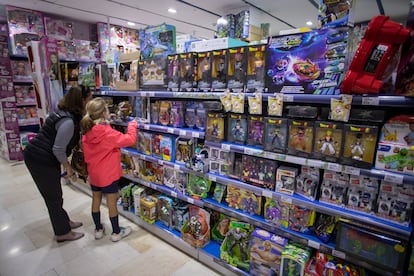No shortages of toys or gin: Spanish firms promise well-stocked shelves this Christmas
Department stores, supermarkets and toyshops report that while some products may be missing this festive season, there will be no major problems as a result of the global supply chain crisis

Liliana Trejo thought it strange that there was an empty space on the shelf where the hypermarket Makro usually stocks Seagram’s gin. She runs a bar called Molinero in the Madrid district of Hortaleza, and her customers usually get through two bottles of the brand a week. But it’s been weeks since she has been able to find it, and her regulars have started to change their drinking habits.
Diego Duque has just become a dad and has moved to Rivas-Vaciamadrid, a municipality 35 kilometers from Madrid. He went to a Kia dealership in search of a new car and was offered just two models: one lower and one higher than the range he wanted. The salesperson told him he could only sell what was in stock due to the global microchip shortage. In the end, he went for the more-expensive option.
On Wallapop, Spain’s popular online second-hand sales platform, several users are selling the new PlayStation 5 at almost double its original price. “It’s because they can’t be found and they are not going to arrive until mid-March,” one of the users explains. “It took eight months to reach me.”
What do the bar owner, car buyer and video game fans have in common? The answer is simple: they cannot find what they want. It may be a strange feeling for those in countries where globalization has been bringing in goods nonstop for decades. There are many factors behind the crisis: overwhelmed ports filled with containers that no one is collecting due to the shortage of truck drivers; shipping companies that are selling the little space they have left free on their vessels to the highest bidder, which is increasing freight costs; work stoppages in Asian factories due to coronavirus contagions, power outages and meteorological phenomenon; and unbridled demand, especially in the United States, thanks to government checks aimed at encouraging consumption and helping the country bounce back from the coronavirus crisis.
This list does not cover everything. There were already problems in supplies for construction, cars, bicycles, paper, beverages, toys, game consoles and an endless number of electronic products. Spanish business associations, however, say that while there may be one-off shortages of certain products, most people will not even notice the crisis: there will be no widespread shortages or empty shelves. If a product is missing, another will replace it.
Toy industry: “If there isn’t one doll, there will be another”
By this time of the year, the warehouse of the Seville-based toy franchise Osorno-Toyplanet should be nearly full in order to supply its nine stores ahead of the festive season. But this is not the case. “During these dates, we usually have the warehouse 95% full for Kings’ Day, and we are around 60 or 70%,” explains Carolina Osorno, the owner of the company, by telephone. The problem is due to the delays in the imports of components and toys coming from China. This issue has been affecting the company for months: inflatable pools and pool toys that should have been sold in summer arrived at the end of September.
The delays cannot be blamed on a lack of planning: Osorno-Toyplanet sent in its orders in April and May. It has even printed a catalog featuring some of the toys that may not be available, although its suppliers have said they will arrive in time.
Osorno says there is no need to panic. “We recommend that [customers] start doing their shopping a little earlier, but if there is not one doll, there will be another. There are not going to be empty shelves.”
Retail giants: “Shortages are absolutely ruled out”
Sources from Anged, the association that represents large distribution companies – including retail giants such as supermarket Carrefour and Spanish department store El Corte Inglés – strongly deny that there will be product shortages this Christmas. “Shortages are absolutely ruled out – what there could be are one-off problems,” they say.
Meanwhile, sources from El Corte Inglés say that the company has long-term contracts with shipping businesses, meaning it is less exposed to the high cost of last-minute freighting. Ikea, for its part, says that it cannot guarantee the availability of certain products, while retail chain Fnac maintains that it has not experienced any supply issues.
Supermarkets ease concerns: stocks are guaranteed
Aurelio del Pino, the president of the Spanish Supermarket Chain Association (ACES), which represents Auchan Retail, Carrefour, Eroski and SuperCo, says there is no reason to fear empty shelves. “Our businesses are perfectly prepared and the supplies in our stores are permanently guaranteed in any region of the territory,” he says.
Del Pino is calling on the public to not turn one-off issues into the norm. “As sometimes happens, there can be, in a short specific moment, a lack of a certain specific product of a specific brand, due to the complexity of the logistics chain, but the availability of the family of products [...] is completely guaranteed.”
Automobile sector: delays in new cars and more second-hand vehicles
One of the first symptoms of the supply chain crisis was detected in the automobile sector. The shortage of microchips brought plants to a standstill and increased the waiting period for the deliveries of new cars. This in turn has led to more demand in the second-hand car market. According to the car dealership association Ganvam, the cost of used cars has risen 15% in a year, and it is expected that more vehicles older than 10 years will be sold in 2021 than new ones.
Alcohol for Christmas, but no Seagram’s in bars
The shortage of the New York gin brand Seagram’s has shone a light on the supply of alcoholic beverages ahead of Christmas, which is one of the periods of greatest consumption. Seagram’s is owned by Pernod Ricard, and sources from the French company admit that it is also having distribution problems with some of its other brands, such as Beefeater gin and Absolut vodka, due to the shortage of glass bottles, lids and aluminium.
Bosco Torremocha, the managing director of the FEBE sparkling drinks association, also blames the shortages on shipping problems, lack of storage and the peaks in demand. “The sector was working without stock because there was no demand, which is logical given the drastic falls [in consumption] due to restrictions,” he explains, in reference to the measures aimed at curbing the spread of the coronavirus, including the closure of nightlife venues. “There was a call effect, similar to what happened with toilet paper at the beginning of the pandemic,” he adds, referring to the panic buying that swept across Spanish supermarkets last spring.
Electronic products: chip shortages but record results
The PlayStation 5 has not been available for months, but it has already sold more than 13 million units across the world. While the chip shortage has stopped this figure from being even higher, the supply crisis has had more of a slowing than negative effect on sales. Sony Electronics Spain, which also sells televisions, cameras and headphones, admits that it has a problem, but says that the impact has already been costed in their 2021 budget.
Tech company Apple put the economic impact of the supply chain crisis at $6 billion in its third-quarter records. This is one of the reasons why Microsoft has overtaken Apple to become the world’s most valuable company.
Tu suscripción se está usando en otro dispositivo
¿Quieres añadir otro usuario a tu suscripción?
Si continúas leyendo en este dispositivo, no se podrá leer en el otro.
FlechaTu suscripción se está usando en otro dispositivo y solo puedes acceder a EL PAÍS desde un dispositivo a la vez.
Si quieres compartir tu cuenta, cambia tu suscripción a la modalidad Premium, así podrás añadir otro usuario. Cada uno accederá con su propia cuenta de email, lo que os permitirá personalizar vuestra experiencia en EL PAÍS.
¿Tienes una suscripción de empresa? Accede aquí para contratar más cuentas.
En el caso de no saber quién está usando tu cuenta, te recomendamos cambiar tu contraseña aquí.
Si decides continuar compartiendo tu cuenta, este mensaje se mostrará en tu dispositivo y en el de la otra persona que está usando tu cuenta de forma indefinida, afectando a tu experiencia de lectura. Puedes consultar aquí los términos y condiciones de la suscripción digital.









































